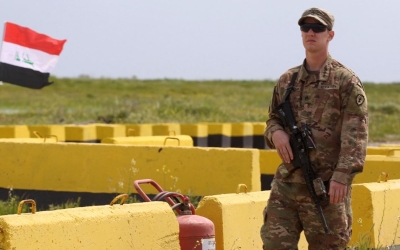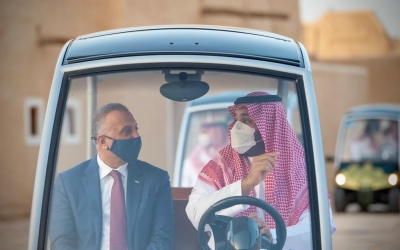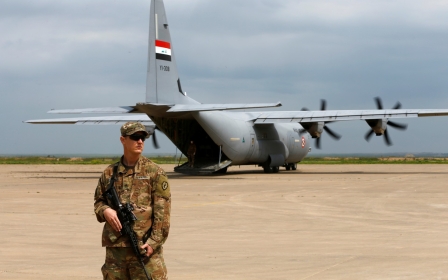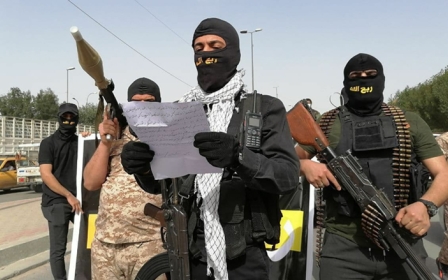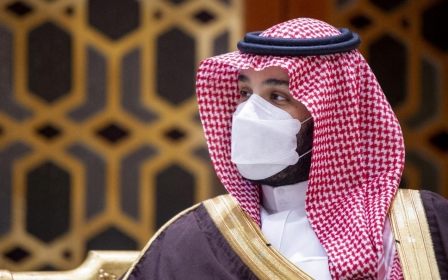Iran-Saudi Arabia talks: Lebanon and Yemen are top priorities
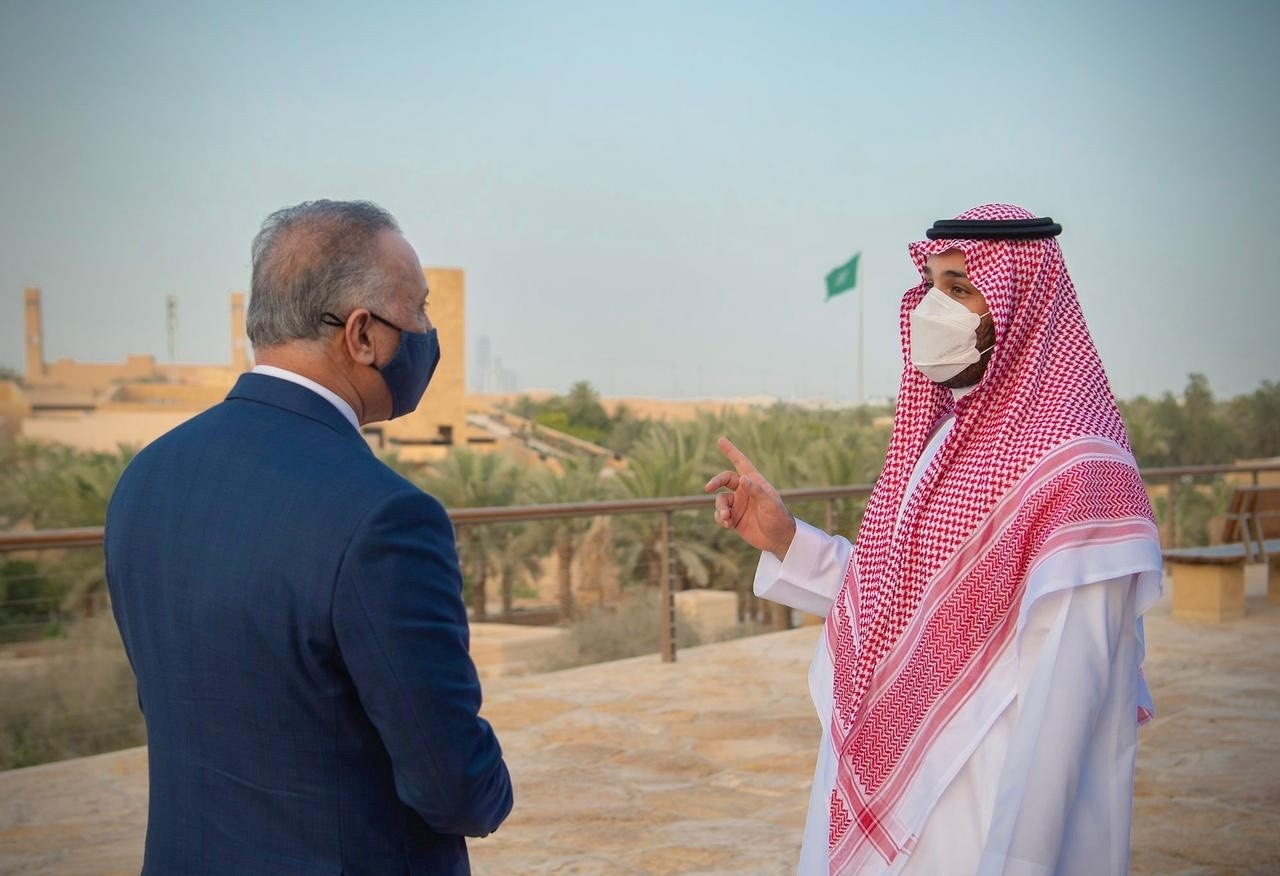
Lebanon and Yemen are the top priority for Iranian and Saudi negotiators holding talks in Baghdad, Iraqi officials familiar with the dialogue told Middle East Eye.
But despite the talks between the regional rivals being held on Iraqi soil, Tehran and Riyadh’s activities in the country are not part of the discussions.
Instead, stopping Houthi attacks on Saudi oil installations and finding a way out of Lebanon's political deadlock are top of the agenda.
Iran and Saudi Arabia, who back conflicting parties in countries across the Middle East and have had no diplomatic relations since 2016, came together in the Iraqi capital on 9 April in an attempt to dial down tensions.
'Iraq is the broker in these negotiations and therefore it will not be part of these talks, especially since the Saudi influence in Iraq is very limited'
- Senior Iraqi official
Iraqi officials and politicians familiar with the progress of the negotiations told MEE that Iraq is not part of the discussions at this stage and that the focus has instead been on other issues the two parties see as priorities.
New MEE newsletter: Jerusalem Dispatch
Sign up to get the latest insights and analysis on Israel-Palestine, alongside Turkey Unpacked and other MEE newsletters
"Iraq is the broker in these negotiations and therefore it will not be part of these talks, especially since the Saudi influence in Iraq is very limited. Therefore the priority is other files," a senior Iraqi official familiar with the progress of the negotiations told MEE. Like everyone interviewed by MEE, the official spoke on condition of anonymity.
"The meetings are still in their infancy, but they are continuing. Both of them need several rounds to break the ice and build confidence between them, especially since the rift has extended for a long time, so they need time before any results emerge," he added.
"For us, we arranged the appropriate conditions for them, provided them with a place, and guaranteed them secrecy. What remains is related to them and not to us."
The mood of the negotiations
Much of Iran and Saudi Arabia's rivalry in the region has been contested along sectarian lines, with political and military conflicts drawn down the Sunni-Shia divide.
Iraq has suffered huge damage from sectarian conflict, especially in the years 2006-2008, when tens of thousands of innocent people of both sects were killed over religious clashes. Dozens of towns and cities witnessed a radical demographic change that none of the successive Iraqi governments have succeeded in dealing with until today.
Although Saudi influence in Iraq has decreased significantly in recent years compared with the influence of Iran, the Saudis have a sway over the stability of Iraqi security that cannot be overlooked.
In addition, it is believed an Iran-Saudi agreement would neutralise the armed factions backed by Iran and the inflammatory Saudi-backed media, opening the door for funds and companies from Riyadh to invest in Iraq, Iraqi officials and politicians told MEE.
As the former head of Iraqi intelligence, Prime Minister Mustafa al-Kadhimi enjoys good relations with the agencies of most countries in the region, particularly Iran and Saudi Arabia.
He is also one of Saudi Crown Prince Mohammed bin Salman's "favourite" allies in the country, Iraqi officials and political leaders close to Kadhimi told MEE.
Kadhimi took advantage of these relations to persuade Saudi and Iranian officials to sit down in Baghdad and address their points of disagreement. He also personally sponsored and directed efforts to bring them closer together, allies said.
The initial indications for the talks have been described as "promising," and the dialogue is continuing - and it has not been limited to specific sessions. An Iranian delegation arrived in Baghdad on Monday to discuss the latest developments with Iran's Iraqi allies and prepare the ground to resume talks at a later time, officials said.
"Things are good and all is OK. Both sides have a strong desire to resolve their disputes," a high-ranking Iraqi official familiar with the negotiations told MEE. "Iraq is qualified to play a positive role in the region."
Saudis need to 'get out of the US orbit'
Signs indicate that Saudi Arabia is currently in a "weaker" position than Iran and that it appears to have a greater need for the talks to succeed, as the new US administration seems uninterested in treating Riyadh as its key ally in the region.
With the Biden administration also seeking to resume the 2015 nuclear deal with Iran, "the Saudis see that the time has come to get out of the US orbit," an Iraqi official said.
Saudi Arabia's six-year war in Yemen against the Houthis is sapping the kingdom, with the Iran-aligned opposition movement routinely launching missiles and drones at Saudi oil installations and airports.
In contrast, Iran, despite its great international isolation and collapsing economy, struck by ferocious US sanctions, has great leverage over the Saudis through its ability to halt the Houthis' attacks, if it so wishes.
'Saudi Arabia appears to be in a desperate situation and needs these talks to succeed. From Iran's point of view, Saudi Arabia cannot do much in Iraq, so Lebanon is at the top of the Iranians’ priorities'
- Iraqi official
US-Iranian negotiations over the nuclear deal are progressing fast, meanwhile, with many of the harshest sanctions expected to be dropped imminently.
Iraqi observers and officials told MEE that Riyadh's top priority is ending the attacks on its soil that are conducted by Iranian allies in Yemen and occasionally Iraq. For the other side, easing relations with Gulf Arab states to end Iran’s isolation and strengthen its economy "is an urgent need. Iran is seeking to achieve it at this stage," an official familiar with the talks said.
While Saudi Arabia can offer Iran a route towards normalisation with its Arab allies, it can also provide support to Lebanon, which is suffering a frightening economic crisis that has gravely affected Tehran's Lebanese proxies.
Despite Lebanon's crisis, its leaders have proved totally incapable of forming a government since the previous one resigned after the huge explosion at Beirut port last August.
Sources say that Riyadh can pressure its ally Samir Geagea, leader of the Lebanese Forces party and the traditional opponent of Hezbollah, "to accelerate the formation of a government backed by Hezbollah," which may be at the expense of Prime Minister-designate Saad Hariri.
"The Iranians are in a better position in these negotiations, despite their economic suffering and their aspiration for an opportunity to normalise their situation in the region and break their isolation," one of the Iraqi officials familiar with the course of the talks told MEE.
"Saudi Arabia appears to be in a desperate situation and needs these talks to succeed. From Iran's point of view, Saudi Arabia cannot do much in Iraq, so Lebanon is at the top of the Iranians' priorities, while Yemen is the Saudis' top priority," he added.
"The new US administration considers the war in Yemen to be the Saudis' problem and they have to solve it by themselves, so this is what the Saudis are trying to do now."
Benefits for Iraq
Iraqi political leaders and observers believe that most of the disputes between Iran and Saudi Arabia are "shows based on slogans rather than actually existing differences," as a political leader close to Kadhimi put it.
Thus, focusing on mutual interests and power-sharing in common arenas "will contribute to easing tensions in the region" and reflect positively in one way or another on Iraq, he said.
"If Iran finds an interest in clearing the air with its traditional opponent in the region through Iraqi mediation, and the United States eases its pressure on Iran, then a strong government in Iraq and a stable security situation will be more beneficial to the Iranians than a weak government and a fragile security situation," the political leader said.
"At some point, if the Iranians feel that they are in a position to strike a real deal with guarantees that cannot be repudiated, they will give up the armed groups they support and protect inside Iraq."
The politician stressed that Tehran will not sacrifice the Houthis or Hezbollah, but would be happy to reduce its support and cover for the armed factions it backs in Iraq.
"In fact, this is the strategy that Kadhimi is working to achieve: presenting a useful ally to Iran that can preserve its interests without problems, losses or sanctions in exchange for its abandonment of the factions inside Iraq," he said.
"Any success in this file will mean that the two parties will continue to support Kadhimi and his government, especially in the next few months, which will inevitably witness many crises ahead of the parliamentary elections in October."
Middle East Eye delivers independent and unrivalled coverage and analysis of the Middle East, North Africa and beyond. To learn more about republishing this content and the associated fees, please fill out this form. More about MEE can be found here.


